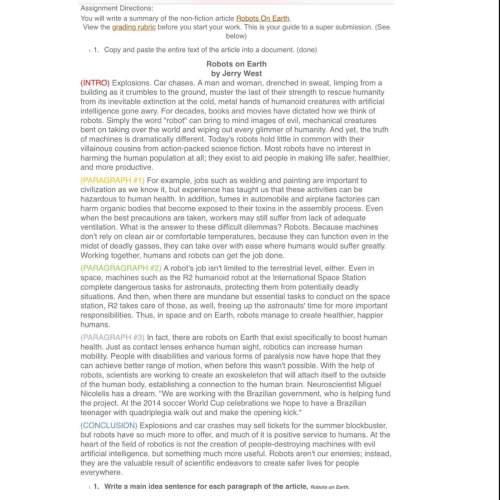
English, 05.10.2019 18:00 bubblzthechicken
Rousseau became enamoured of solitude, and, being at the same time an optimist, he labours with uncommon eloquence to prove that man was naturally a solitary animal. misled by his respect for the goodness of god, who certainly? —for what man of sense and feeling can doubt life only to communicate happiness, he considers evil as positive, and the work of man; not aware that he was exalting one attribute at the expense of another, equally necessary to divine perfection.
reared on a false hypothesis, his arguments in favour of a state of nature are plausible, but unsound. i say unsound; for to assert that a state of nature is preferable to civilization in all its possible perfection, is, in other words, to arraign supreme wisdom; and the paradoxical exclamation, that god has made all things right, and that evil has been introduced by the creature whom he formed, knowing what he formed, is as unphilosophical as impious.
what is wollstonecraft’s purpose in citing rousseau’s theory?
a)to applaud his theory
b)to disprove his theory
c)to agree with his theory
d)to elaborate on his theory

Answers: 2


Another question on English

English, 21.06.2019 20:00
Hich statement offers the best comparison of the two poems? where have you gone." i am a black woman.
Answers: 1

English, 21.06.2019 22:30
How could an audio recording most likely convey the characters emotions during the scene
Answers: 1

English, 22.06.2019 01:50
Why college athletes should not get paid to play conclusion
Answers: 2

English, 22.06.2019 03:30
In just over one hundred years, between 1701 and 1810, 252,500 enslaved africans were brought to barbados—an island that occupies only 166 square miles (making it, today, one of the smallest countries in the world). the english then set out to conquer more sugar islands, starting with jamaica, which they took from spain in 1655. in the same period that the 252,500 africans were brought to barbados, 662,400 africans were taken to jamaica. thus, sugar drove more than 900,000 people into slavery, across the atlantic, to barbados and jamaica—and these were just two of the sugar islands. the english were eagerly filling antigua, nevis, saint kitts, and montserrat with slaves and sugar mills. they took over much of dutch guiana for the same reason. seeing the fortunes being made in sugar, the french started their own scramble to turn the half of the island of hispaniola that they controlled (which is now haiti), as well as martinique, guadeloupe, and french guiana (along the south american coast near dutch guiana), into their own sugar colonies, which were filled with hundreds of thousands more african slaves. by 1753, british ships were taking average of 34,250 slaves from africa every year, and by 1768, that number had reached 53,100. –sugar changed the world, marc aronson and marina budhos how do the authors use historical evidence to support their claim? x(a) they use secondary sources to show how french and english monarchs were indifferent to enslaved people. x(b)they use secondary sources to show that enslaved people often fought for their freedom after arriving in the caribbean. the answer is: (c)they use facts from primary sources to show how countries increased the number of enslaved people to produce more sugar. x(d)they use primary source interviews to show that countries could make more money in trading sugar without using enslaved people.
Answers: 1
You know the right answer?
Rousseau became enamoured of solitude, and, being at the same time an optimist, he labours with unco...
Questions

Computers and Technology, 31.01.2020 03:47

Mathematics, 31.01.2020 03:47

History, 31.01.2020 03:47



Mathematics, 31.01.2020 03:47


Mathematics, 31.01.2020 03:47

Business, 31.01.2020 03:47

History, 31.01.2020 03:47


Biology, 31.01.2020 03:47

Biology, 31.01.2020 03:47

Mathematics, 31.01.2020 03:47



Social Studies, 31.01.2020 03:47

Biology, 31.01.2020 03:47

History, 31.01.2020 03:47




